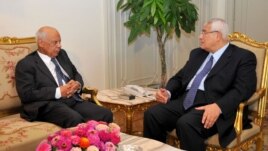
Interim President Adly Mansour, right, meets with Hazem el-Beblawi, left, in Cairo, Egypt, July 9, 2013.
RELATED ARTICLES
 Egyptian Army Defends Shooting of Pro-Morsi Protesters
Egyptian Army Defends Shooting of Pro-Morsi Protesters
 Muslim Brotherhood Rejects Egypt Transition Plan
Muslim Brotherhood Rejects Egypt Transition Plan
Egypt Seeks End to Crisis With Quick Elections
Source: UAE to Give Egypt $3 bln in Loans, Grant, Saudi Aid Expected
Edward Yeranian
July 09, 2013
CAIRO — Egypt's interim President Adly Mansour has selected veteran economist and former Finance Minister Hazem el-Beblawi to be the country's interim prime minister. Opposition leader Mohamed ElBaradei was also chosen to be vice president for international affairs.
Hazem el-Beblawi was chosen to head the new interim government after hours of intense behind-the-scenes negotiations. Vetoes by the Salafi Nour Party of several other candidates reportedly prolonged the selection process.
Top opposition leader and former International Atomic Energy Agency chief Mohamed ElBaradei was selected to be interim vice president, with responsibility for Egypt's international affairs. ElBaradei was a top contender for the prime minister's post, but his nomination was blocked by the Nour Party.
El-Beblawi, who served as finance minister under Egypt's first revolutionary government under former Prime Minister Essam Sharaf, has extensive experience dealing with Egypt's Western allies and is well-versed over its economic troubles.
Veteran editor and publisher Hisham Kassem notes Egypt “needs a manager with a clear understanding of the economy in the coming months.” Egypt failed to secure a $4.8 billion International Monetary Fund loan in recent months and negotiations remain stalled.
Egypt's foreign currency reserves have dwindled dramatically since long-time president Hosni Mubarak was toppled in February 2011. The Egyptian currency has lost more than 10 percent of its value this year and the vital tourism sector is in the doldrums.
Interim President Adly Mansour also met Tuesday with a high-level delegation from the United Arab Emirates. Journalist Kassem says he thinks several Gulf States, including the UAE and Saudi Arabia, are ready to help Egypt.
"As far as the Gulf is concerned, they are happy to see the back of the [Muslim] Brotherhood. It was a menace for them ... Already we see a delegation of six Cabinet ministers from the Emirates," said Kassem. "We see the Saudi monarch congratulating the Egyptian people. To me that's an indicator that there will be support ... and I anticipate more support coming from the rest of the Gulf."
RELATED ARTICLES
Egypt Seeks End to Crisis With Quick Elections
Source: UAE to Give Egypt $3 bln in Loans, Grant, Saudi Aid Expected
Edward Yeranian
July 09, 2013
CAIRO — Egypt's interim President Adly Mansour has selected veteran economist and former Finance Minister Hazem el-Beblawi to be the country's interim prime minister. Opposition leader Mohamed ElBaradei was also chosen to be vice president for international affairs.
Hazem el-Beblawi was chosen to head the new interim government after hours of intense behind-the-scenes negotiations. Vetoes by the Salafi Nour Party of several other candidates reportedly prolonged the selection process.
Top opposition leader and former International Atomic Energy Agency chief Mohamed ElBaradei was selected to be interim vice president, with responsibility for Egypt's international affairs. ElBaradei was a top contender for the prime minister's post, but his nomination was blocked by the Nour Party.
El-Beblawi, who served as finance minister under Egypt's first revolutionary government under former Prime Minister Essam Sharaf, has extensive experience dealing with Egypt's Western allies and is well-versed over its economic troubles.
Veteran editor and publisher Hisham Kassem notes Egypt “needs a manager with a clear understanding of the economy in the coming months.” Egypt failed to secure a $4.8 billion International Monetary Fund loan in recent months and negotiations remain stalled.
Egypt's foreign currency reserves have dwindled dramatically since long-time president Hosni Mubarak was toppled in February 2011. The Egyptian currency has lost more than 10 percent of its value this year and the vital tourism sector is in the doldrums.
Interim President Adly Mansour also met Tuesday with a high-level delegation from the United Arab Emirates. Journalist Kassem says he thinks several Gulf States, including the UAE and Saudi Arabia, are ready to help Egypt.
"As far as the Gulf is concerned, they are happy to see the back of the [Muslim] Brotherhood. It was a menace for them ... Already we see a delegation of six Cabinet ministers from the Emirates," said Kassem. "We see the Saudi monarch congratulating the Egyptian people. To me that's an indicator that there will be support ... and I anticipate more support coming from the rest of the Gulf."
No comments:
Post a Comment